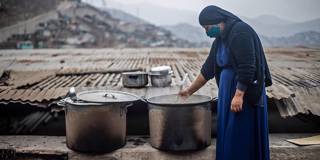On top of the COVID-19 pandemic and the increasingly disruptive effects of climate change, countries around the world are experiencing dangerous levels of food and energy insecurity and debt distress. And while the international community has taken some initial steps to address these problems, much more can and should be done.
EDINBURGH – At recent gatherings of G7 leaders, NATO members, and G20 foreign ministers, it was clear to everyone that the world is facing a confluence of emergencies unlike anything we have seen in decades. International tensions have risen to alarming heights on the back of increasing food and energy insecurity, depreciating currencies, looming debt crises, the ongoing COVID-19 pandemic, the intensifying effects of climate change, and armed conflicts.

EDINBURGH – At recent gatherings of G7 leaders, NATO members, and G20 foreign ministers, it was clear to everyone that the world is facing a confluence of emergencies unlike anything we have seen in decades. International tensions have risen to alarming heights on the back of increasing food and energy insecurity, depreciating currencies, looming debt crises, the ongoing COVID-19 pandemic, the intensifying effects of climate change, and armed conflicts.